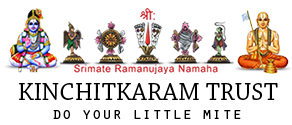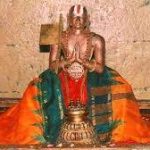Srimate Ramaanujaye Namaha,
Vikram swamy, not sure if i understood your follow up question properly.. probably you are saying the variety of desires that soul has is also given by paramatma only, so we are not responsible?
If this is the case.. please refer to lesson 25 in vedanta course by Ranganathan swami. I have cut and paste the relevant sections below. But if it is too long.. the summary is the first choice (first instant/fraciton of second of any action) is made by aatma then paramatma permits and supports him more in that direction (from the second instance/kshanam). For exceptional souls who are exalted devotees, Bhagawaan Himself gives them the situaitons / incites them to perform more bhakthi.. ( the first step of becoming a bhakta is the soul’s choice,,after a certain state of purity is reached..Bhagawaan ensures more situations to increase the Bhakthi..).
So the differences in desires between souls we see in this world is because of our karma, ruchi and our free will and not because of Paramatma..
But this original thread is perhaps about the variety in pure devotees like Hanumaan, Lakshmanar etc.. different people have different mood towards the Lord.. this difference is not because of our karma/free will nor because of Parmatma..it is how things are ..in the natural state..each one has a specific relation and mood towards the Lord. (This last para is not from reference below but based on hearing from upanyaasams)
Reference from Vedanta lesson (25)
***************************************************************************************
Purvapaksha Questions: If we accept that the Paramatma controls the Jivatma, the following doubts may arise: 1. If the Jivatma cannot act independently, then why do the Vedas preach to him? He does not have the ability to decide and act independently. Therefore, are all the Vedic Commands worthless? 2. If Paramatma controls all the Jivatmas and makes them do all the actions, then it should be Paramatma who gets the results of that act, not the Jivatma. The Papa or Punya that comes from an act must go to Paramatma, not Jivatma. Is that possible? 3. If it is Paramatma who makes people do bad things also, and they attain bad fates because of that and suffer, then does Paramatma have no compassion at all? 4. Paramatma makes some people do good acts and receive Punya and thereby experience pleasure. He also makes some people do bad acts and receive Paapa and thereby experience sorrow. Why does he act in such a biased manner? Is this favouritism fitting for the Paramatma? 5. If it is Paramatma who controls everyone, then is there no scope for me to think, act and change my path? Otherwise, of what use is the ability to think that I have?
Siddhanta Answers: Veda Vyasa writes the next Sutram to answer all these questions – “krtaprayatna-apekshastu vihita-pratishiddhaavaiyarthyaadibhya:” (2-3-41). Swamy Ramanuja explains this as follows – “The Paramatma, who is the Antaryami (One who resides within and controls), waits for the Jivatma to make the first effort in each and every activity and then promotes the activity by providing his Permission (Anumati).” This one sentence can clear all our doubts. • Every Jivatma takes birth in a body according to his previous Papa and Punya; he comes across many objects in that birth; according to the ‘Ruchi’ (predisposition) that he has developed in his countless previous births, he will desire or hate that object; accordingly he will make an initial effort to attain or avoid that object; this is then followed by several other efforts towards that goal. • In this sequence, until the Jivatma decides on a goal and makes the first effort towards that goal, Paramatma who is the Antaryami (he who resides within and controls) is Udaaseena or Indifferent. Once the first effort is made, in the next instant, Paramatma permits it, irrespective of whether the act is good or bad. If he does not permit, then no activity is possible in this world. Therefore, the second state of Paramatma is as an Anumanta or Permitter.
- Answer 1 – Therefore, since the Jivatma has the independence to decide and make the first effort on his own, without anyone’s interference, it is correct for the Vedas to preach to and command the Jivatma to perform and abstain from certain acts. Therefore, the Vedas do not become worthless.
Answer 2 – Consider that there is wealth common to two people. One of the owners wishes to give a portion of it as a gift to the King of the land. He takes the permission of the other owner and gifts the wealth to the King, who in turn, pleased by the gifts, bestows many items to the first owner. Here, the right to enjoy those gifts belongs only to the first owner, and not to the second owner who merely permitted the gift. Similarly, here too, since it is the Jivatma who decides and takes the effort to perform and activity, any Papa or Punya coming from it would also only go to him, not to the Paramatma who merely permitted it. • Answer 3 – When someone decides and makes the first effort in a sinful activity, the Paramatma still permits it. This does not make him lacking in compassion. The Permission that Paramatma gives is itself the punishment for that Jivatma making an effort in a sinful activity. • Answer 4 – It cannot be claimed that the Paramatma acts in a biased manner towards certain Jivatmas, since he allows the Jivatmas to exercise their free will and make efforts in an activity of their choice and merely permits it to happen, whatever the act may be. Therefore, he does not incite them. • Answer 5 – Since the Jivatma has the independence to decide and act on his own, the Knowledge that the Jivatma possesses does not go waste
Therefore, the meaning of the phrase “Bhagavan controls this world” is as follows – “He remains Udasina (Indifferent) until the Jivatma independently decides and begins to act towards a certain goal and then he acts as a Permitter (Anumanta) to that act”. • However, there is an exception to this. The Upanishads say “esha eva saadhu karma kaarayati tam yam ebhya: lokebhya: unniniishati, esha eva asaadhu karma kaarayati tam yam adho niniishati”. This means – “when Paramatma wishes to uplift someone, he makes them perform good deeds, when Paramatma wishes to cast down someone, he makes them perform sinful deeds”. • This verse does not speak about Paramatma being Indifferent or just a Permitter. It says he goes beyond that and actually makes the Jivatma perform certain deeds. However, He does not play this role with everyone. It is only with a select few. • Lord Krishna clarified this in the Bhagavad Gita – “when someone has enormous Bhakti towards Me and wishes to reach Me, I incite them to perform good deeds”. “if someone has enormous hatred towards me, then I make them perform even worse deeds and cast them down to sinful births, that too to somehow correct them”. • Therefore, this third role of Bhagavan called Prayojaka (Inciter) is not towards everyone but towards a few select good people like the Azhvars and a few select bad people like Ravana, etc. He does not incite common people like us.
Adiyen
Thirukachidaasanudasan

